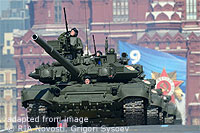Interview: Why The ‘Failure’ Of Russian Spies, Generals Is Leading To ‘Apocalyptic’ Thinking In The Kremlin

(Article text ©2022 RFE/RL, Inc., Radio Free Europe/Radio Liberty – rferl.org – Reid Standish – May 8, 2022 – article text also appeared at rferl.org/a/russia-ukraine-war-setbacks-strategy-generals-putin/31839737.html)
As frustration over its stalled war in Ukraine and curtailed goals on the ground has grown, it appears the Kremlin may have begun to look for enemies within.
 Andrei Soldatov, a Russian investigative journalist who has covered the country’s shadowy security services for decades, reported in April that Colonel General Sergei Beseda, the head of the foreign intelligence branch of the Federal Security Service (FSB), was detained and later sent to Moscow’s Lefortovo prison.
Andrei Soldatov, a Russian investigative journalist who has covered the country’s shadowy security services for decades, reported in April that Colonel General Sergei Beseda, the head of the foreign intelligence branch of the Federal Security Service (FSB), was detained and later sent to Moscow’s Lefortovo prison.
The reported move was seen as a sign of a deepening rift between the Russian military and the FSB over its alleged intelligence failures leading up to Russia’s February 24 invasion of Ukraine and of growing paranoia in Moscow that forces within the intelligence apparatus may even be working against the Kremlin.

With the brutal Ukraine war grinding on, Russia’s intelligence services and military planners are still grappling with how to respond to stronger than predicted Ukrainian resistance and more formidable Western support for Kyiv. As the war enters its 11th week, questions continue to swirl around how the Kremlin got its prewar planning so wrong, whether it may look to mobilize new soldiers for Ukraine, and what lessons it has learned from its early failures.
To get a better understanding of how things might progress, RFE/RL spoke with Soldatov, who is also a fellow at the Center for European Policy Analysis (CEPA) in Washington.
RFE/RL: You’ve reported that Colonel General Sergei Beseda was detained and sent to prison. What’s your sense of what is behind this move and what does it tell us about the current state of the Russian intelligence services and Russia’s elite?
Andrei Soldatov: [That story] is getting more interesting and more complicated. We already see a lot of confusion, but also some attempts by the FSB to downplay the conflict [under way] among the security services and the military. There were some reports…about Beseda being present at a funeral of a very prominent former KGB officer, [Nikolai] Leonov, who was one of Fidel Castro’s handlers in Cuba years ago, and that’s why he became a sort of legend [within] the KGB.
What that likely tells us is that if the FSB made this large effort to present [Beseda] at this funeral to [try to] kill the conversation [and speculation] about him [and this rift], then they actually have a big problem.
This problem is definitely there [and] right now the military is blaming the FSB for many things. [It’s] not only about the decision to go to war [and how they did it], but also about how the war is being conducted and all the mistakes that are being made.
Of course, we are not talking about the [Russian] military thinking that it was better to not get into the war. Unfortunately, I don’t see that as a big sentiment in the military. They’re quite pro-war, actually — aggressively pro-war, I’d say. They’re just not happy with the way it has been conducted.
RFE/RL: Intelligence within this war — and in the lead-up to it — has played a rather public and prominent role, both in terms of what appears to be a failure on the part of the Russian side and what looks like some well-informed intelligence about the Russian invasion from the West. How is this shaping things and what is the sense in Moscow about why this war went wrong?
Soldatov: [You] might expect the military to blame people like Sergei Shoigu, the minister of defense, for all the failures that the Russian Army has experienced, especially during the first two months of the war, but [I] don’t see Shoigu being criticized by the army or by the security services, which [is] very surprising to me.
He’s still very popular and widely respected, despite the fact that he has no military background and no military training, and despite all these big failures [since] February [in Ukraine]. The problem here is that the military is getting more and more apocalyptic in how they see this war. They started out thinking that it would be a very short campaign, and they blamed the FSB for misinforming President [Vladimir] Putin that they wouldn’t face more resistance, but now they accept this new reality [on the ground].
And this new reality for them, as they see it, is that Russia still has a peacetime army while [they] face [a] completely mobilized Ukrainian Army that is now being supplied by the West with the best weapons on the planet.
That is why the Russian military feels completely outgunned and outnumbered. It [also] looks like the intelligence agencies [are beginning] to understand that and now they are adjusting to this new narrative. We now see top Russian spies like [Security Council Secretary Nikolai] Patrushev, [the head of the SVR, Russia’s foreign intelligence service, Sergei] Naryshkin, and others actually supporting this new narrative that it’s not only about [fighting] with Ukraine, but that it’s [actually] this big war between Russia and NATO. It’s a more apocalyptic and a more global [view of the conflict].
RFE/RL: What is your sense about why this view is being adopted? Is this to justify pushing for mobilization across Russia, as some people have theorized could be coming, or do you see something else driving it?
Soldatov: I think it’s not only the [prospect of] mobilization, it’s also about the feeling [from the military and intelligence services] that they have picked a fight with NATO, but in the wrong place, because [they] are sustaining high casualties but are not in a position to inflict any damage [in return] on NATO. This is a source of big frustration [for] the military. They’re fighting in Ukraine and suffering very high losses while losing lots [of] equipment, [but] are not in a position to fight back as they believe they should.
[This is] also a good explanation for why they are suffering from all these problems [in the first place]. [They] can’t blame [themselves]. Psychologically, it’s very uncomfortable to say that [they] did something wrong, that [the] planning was bad, or that the logistics were not sufficient. [It’s] much easier to say [that] the problem is what [they’ve] always suspected, which is that the West is being treacherous and attacking us in an [underhanded way]. [They believe] they started a small [conflict] in Ukraine and now they are getting attacked by the West disproportionately and that is why they are facing these problems.
RFE/RL: So where do you see this “apocalyptic” thinking, as you describe it, leading to?
Soldatov: The biggest problem is about objectives. As an example, I checked recently [on] some polls conducted by Telegram channels [that] are really close to the Russian military and [they were] quite astonishing to me. They asked questions about what [soldiers thought] an acceptable objective to declare victory for this war [would be], and you have around 25 percent saying that [they would] need the complete capitulation of Ukraine and more than 30 percent saying they would want to get Russian troops to the border with Poland.
But the most astonishing number is that only 6 percent said they would be happy with only [taking the] Donbas. That is very worrying. It means that the objectives pronounced by Putin at the beginning of the war are not necessarily the same ones the military sees as appropriate and acceptable.
RFE/RL: You have some unparalleled sources within the Russian intelligence services. Why do you think that they are still talking to you?
Soldatov: It was a big concern for me, obviously. After the war started, I thought we might lose some sources because my own anti-war position was very clear and, for [about] three weeks, [that’s] exactly what happened. But after that, the sources came back, and it looks like [they did] for different reasons.
It’s not like they are [talking] because they think the [war] is wrong. It’s not that [at all]. It’s about their sense of frustration and the need to blame someone for all these problems. You have the military blaming the FSB and the FSB blaming some particular departments within the FSB for the problems they are facing. So, it’s basically a blame game.
RFE/RL: Is it just looking for a scapegoat or do you also get a sense that there is a genuine urge to understand the mistakes and learn from them?
Soldatov: The problem here is that [there isn’t] a tradition in the Russian military or the Russian security services to [acknowledge] and [learn from] the mistakes they’ve made.
That’s part of why Putin was always so popular among the security services. His approach throughout all these years was that if something happened, and you think to blame the FSB or the military, the best option is actually instead to give them more [support and resources] because [they] need to be protected and defended from criticism and [scrutiny].
You have this new factor of the public opinion within the military on Telegram combined with a complete lack of tradition for how to talk about these things.”
And that is a problem now [at a time] when they need to adjust and change their strategy. They’re waiting for changes at the top, but they don’t know how to talk about it.
They’re quite happy with the decision by Putin to appoint [General Aleksandr] Dvornikov [to be in charge of the Ukraine campaign] because at least that is something that’s been needed since Day One. But again, they still don’t quite understand what to do next.
The other problem is that they’re not quite ready. The fact is that this war is different from Putin’s previous wars [in Georgia, Syria, and eastern Ukraine] because now we have Telegram channels. [On those], you have pro-military public opinion where you have lots of soldiers, lots of officers, [and] lots of veterans all talking — not very openly — but still expressing criticism toward the military.
It might be about very small things. For instance, there was a big frustration about radio sets for helicopters recently. [They were asking in these channels] why they don’t have them and whether they need to collect some money, [which] led to a crowd-sourcing campaign [back in Russia.] In response, the Defense Ministry said that they don’t need them [and] that sparked some bitterness among soldiers and veterans alike for seeing the leadership as out of touch with their needs and unable to listen.
So you have this new factor of the public opinion within the military on Telegram combined with a complete lack of tradition for how to talk about these things.
This interview was edited and condensed for clarity.
